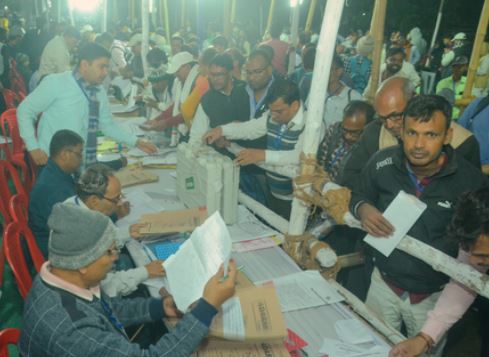Recent election results from Bihar Legislative Assembly could be counted as great pointers for the emergence, in the near future, of a healthy democratic atmosphere in India. Undoubtedly, the general feeling that media reports gave prior to polling was that Nitish + BJP and allies had an uphill task this time around. That had put the Tejasvi led RJD + Congress INDIA bloc on an upbeat mood that probably prompted leaders like Rahul Gandhi to jump from a boat into waist-deep waters to prove solidarity with a handful of fisher folks gathered around the spot. Those days of showmanship are, most likely, over in Indian politics. Time is running fast and those who are leading the Opposition in India have to understand what the younger generation in this country needs.
Bihar and Uttar Pradesh, considered the Hindi Heartland, are the key two states that any party dreaming to rule the nation has to first conquer. With a large number of Lok Sabha seats that these two states share amongst themselves, any government in Delhi has no alternative but to hold on to these over populated and lesser developed territories for dear life. People’s thoughts are dominated here by caste and religion which in turn affects the manner politics is conducted in these lands. Simply criticizing the Special Intensive Revision (SIR) of the voters’ list, blaming EVMs (Electronic Voting Machines) or overall the role of the Election Commission of India brought the INDIA bloc to the present number of seats. Without an alternative narrative that could have offered food for thought to the youth of Bihar, the Opposition failed in its attempt to create an atmosphere which could have made people opt for change. Admittedly, Indians are not going to be guided by a bunch of Zen G kids.
What India of the hinterlands could be waiting for is a leadership that has the strength to pose separate thoughts in subjects such as foreign policy, monetary policies that help in economic growth and not just job opportunities because every half educated Indian has understood a new government will be equally incapable to offer employment to every family. It was essential to talk about how daily life could be changed and made easier for the average citizen. Such simple subjects were, as was observed from media reports, not dealt with by the leaders campaigning for the INDI Alliance and so they may not have successfully touched the correct nerve of the voters.
Also Read: People Trump
Recent victories scored by the Congress could primarily be attributed to local leaders like D K Shivkumar in Karnatake or Revanth Reddy in Telangana or Sukhvinder Singh Sukhu in Himachal Pradesh. Very little credit can be given to Rahul Gandhi for his party winning those states. Tejasvi in Bihar, on the other hand, sounded lame and bereft of substance in his messaging five years ago as also in the just concluded elections. That could have been one of the many important factors leading to the dismal performance of the Opposition.
Another notable aspect in Bihar elections this time was the near absence of violence and therefore re-polling was probably not required at any booth. This achievement is not to be underplayed at all.
The belief that people are always looking for an ‘alternative’ may not be holding ground in today’s India. One of the best examples supporting this notion is Orissa. Absence of alternatives was not a hindrance for voters of this state to opt out of the clutches that Naveen Patnaik and his associate VK Pandian seemed to have had over the citizens. If people get convinced that what is being hatched for them may in reality go against what they wish or want, they simply throw out the incumbent and do not bother who comes in. No political leader or party can claim credit for this great change that manifested in Orissa in 2024.
In Bihar however it seems there was no such backgrounder nor could the INDI Alliance succeed in creating an atmosphere where the average voter wanted free breathing space. Indian politics is changing faster than politicians can imagine.
